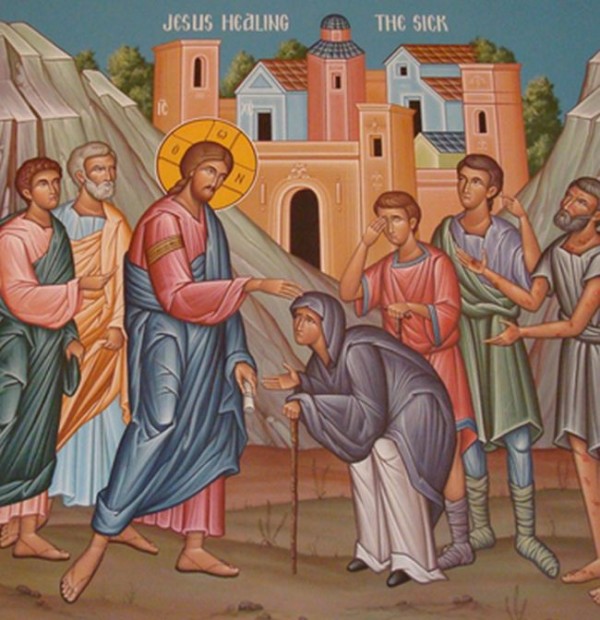In the name of the Father, and of the Son, and of the Holy Spirit, One God, Amen.
I have a spirit of infirmity, dear brothers and sisters, and like the oxen and donkeys I do not look up to Heaven and draw myself to God but I look down at the manger and consider only my worldly desires and ambitions. In this state the Lord comes to me in my utter wretchedness and says to me, “you are freed from your infirmity.” And the Lord comes and says the same to each of you, that we may stand tall together and regard things heavenly over earthly, immortal over mortal, living over dying.

The ruler of the synagogue, too, had a spirit of infirmity, but his was much more serious. For the woman who could not straighten herself had the infirmity physically, he had it spiritually. “There are six days on which work ought to be done;” he cries out indignantly, “come on those days and be healed, and not on the sabbath day.” He speaks thus because he does not understand the Sabbath: for him the Sabbath is merely to make sacred only one day of the week, but the Sabbath is to bring the love of God into every day. The Sabbath is to reveal to God’s people—even in this world of wickedness—the power and majesty of God so that they may be a light to the nations. The Sabbath is not to tie the hands of Israel but to express the freedom Israel has been given: true freedom, complete freedom, freedom with God.
And I am drawn to look, and think, and consider, am I like the ruler? Do I rejoice when another comes to freedom or do I moan that a “law” has been broken? Am I restricting the Gospel only to those whom I consider worthy? Do I love canons and laws above God and my neighbour? The Lord’s adversaries in the synagogue were put to shame, yet do I miss even that when I am shown the truth? Do I remain unmoved in my position even when the truth is revealed to me?
My dear brothers and sisters in Christ, you are offered healing by the Lord—healing spiritually now whereas physically may not come until the Last Day—accept it, live it, rejoice in it. And accept too the healing of others, whether we consider them worthy or otherwise: because they are each more worthy than I am and the Lord will forgive me to the extent I have forgiven them.
That we may all grow in faithfulness and wisdom and follow the Law-giver, our Lord Jesus Christ, and come to knowledge of the one God and Father through him by the power and operation of the Holy Spirit. Amen.
Brethren, the fruit of the Spirit is love, joy, peace, patience, kindness, goodness, faithfulness, gentleness, self-control; against such there is no law. And those who belong to Christ Jesus have crucified the flesh with its passions and desires. If we live by the Spirit, let us also walk by the Spirit. Let us have no self-conceit, no provoking of one another, no envy of one another. Brethren, if a man is overtaken in any trespass, you who are spiritual should restore him in a spirit of gentleness. Look to yourself, lest you too be tempted. Bear one another’s burdens, and so fulfill the law of Christ.
— Galatians 5:22–26, 6:1–2
At that time, Jesus was teaching in one of the synagogues on the sabbath. And there was a woman who had a spirit of infirmity for eighteen years; she was bent over and could not fully straighten herself. And when Jesus saw her, he called her and said to her, “Woman, you are freed from your infirmity.” And he laid his hands upon her, and immediately she was made straight, and she praised God. But the ruler of the synagogue, indignant because Jesus had healed on the sabbath, said to the people, “There are six days on which work ought to be done; come on those days and be healed, and not on the sabbath day.” Then the Lord answered him, “You hypocrites! Does not each of you on the sabbath untie his ox or his donkey from the manger, and lead it away to water it? And ought not this woman, a daughter of Abraham whom Satan bound for eighteen years, be loosed from this bond on the sabbath day?” As he said this, all his adversaries were put to shame; and all the people rejoiced at all the glorious things that were done by him.
— Luke 13:10–17
